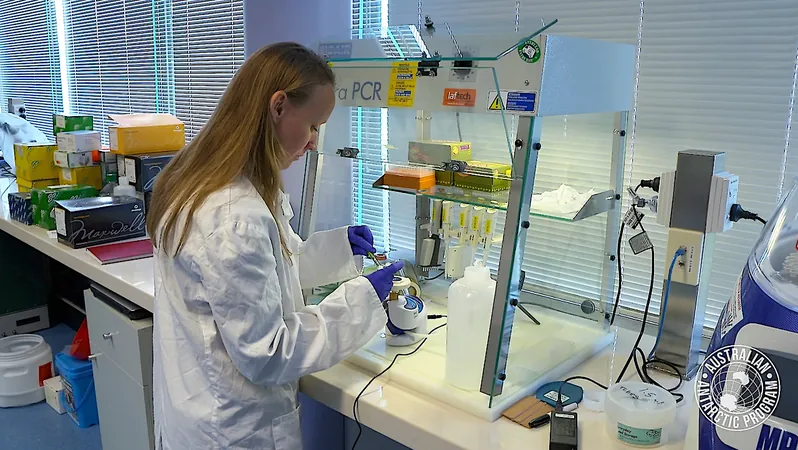
Dengue Defense: Innovative Mosquito Technology Generates Debate in Indonesia!
2024-10-07
Overview
In a groundbreaking move to combat dengue fever, the Jakarta administration has initiated a daring program in West Jakarta's Kembangan district: the release of thousands of mosquito larvae infected with Wolbachia bacteria. This new initiative aims to reduce the transmission of dengue fever, a serious health concern in Indonesia.
Background and Statistics
Kembangan was specifically chosen due to its alarming dengue case rates, reporting 54.1 cases per 100,000 individuals in 2023, according to the Jakarta Health Agency. West Jakarta recorded its highest numbers in April with 799 cases, which has since declined. The local government plans to distribute buckets filled with Wolbachia-infected mosquito eggs and larvae to nearly 1,200 households, effectively utilizing community involvement to ensure the larvae transform into adult mosquitoes.
How Wolbachia Works
Wolbachia is a naturally occurring bacterium found in approximately 60% of all insect species, but intriguingly absent in Aedes aegypti—the notorious mosquito responsible for dengue. By infecting Aedes mosquitoes with Wolbachia, researchers have discovered that the bacterium disrupts the dengue virus, significantly decreasing the mosquitoes' ability to transmit the disease to humans.
Reproductive Impact of Wolbachia
In a fascinating twist of nature, when an infected male mosquito mates with an uninfected female, the resulting eggs fail to hatch. Conversely, if both parents carry Wolbachia, their offspring do too and are thus rendered ineffective at spreading dengue.
Skepticism and Public Concerns
Despite its promising results from previous studies—showing a reduction in dengue cases by 77% and an 86% decrease in hospitalizations—this innovative approach has not been met without skepticism. Many residents have voiced concerns, fueled by misinformation that suggests lab-bred mosquitoes could harm both humans and pets. Specifically, some claims allege a possible link between Wolbachia and an increase in heartworm disease in dogs and cats.
Scientific Reassurances
However, a recent study published in Scientific Reports debunked this theory, asserting that Wolbachia does not enhance the transmission of heartworm. Wahyu Hidayat, a veterinary medicine doctoral candidate in Japan, reassured pet owners: 'The commonly available worm medication is more than effective to kill heartworms.'
Expert Panel Insights
Nevertheless, public resistance remains a significant hurdle. A panel of 25 experts, comprising researchers in virology, entomology, and socioeconomic studies, has assessed the potential risks associated with this program. They determined that the dangers are minimal, emphasizing the importance of combating unfounded claims.
Political Implications
Political dimensions also shadow the pilot project, especially with Jakarta's gubernatorial election approaching in November. Dharma Pongrekun, a retired police general and vocal critic of the Wolbachia initiative, is campaigning for the governor's position. He has historically warned against the project, equating the release of engineered mosquitoes with a disruption of nature.
Moving Forward
In contrast, health officials affirm their commitment to transparency and community dialogue. They hope to ease fears and clarify how Wolbachia technology could revolutionize dengue prevention.
Conclusion
With dengue fever still posing a significant threat in Indonesia, this innovative yet controversial approach raises crucial questions: Can science mitigate both disease and public fear, or will resistance impede this promising project? Stay tuned as this story unfolds—Jakarta’s health and political landscapes may forever change!





 Brasil (PT)
Brasil (PT)
 Canada (EN)
Canada (EN)
 Chile (ES)
Chile (ES)
 España (ES)
España (ES)
 France (FR)
France (FR)
 Hong Kong (EN)
Hong Kong (EN)
 Italia (IT)
Italia (IT)
 日本 (JA)
日本 (JA)
 Magyarország (HU)
Magyarország (HU)
 Norge (NO)
Norge (NO)
 Polska (PL)
Polska (PL)
 Schweiz (DE)
Schweiz (DE)
 Singapore (EN)
Singapore (EN)
 Sverige (SV)
Sverige (SV)
 Suomi (FI)
Suomi (FI)
 Türkiye (TR)
Türkiye (TR)